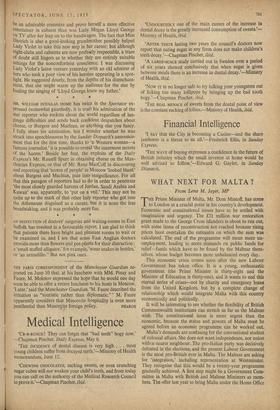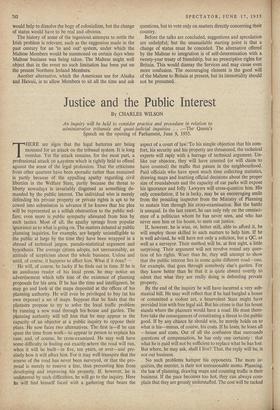WHAT NEXT FOR MALTA ?
From Lena M. Jeger, MP THE Prime Minister of Malta, Mr. Dom Mintoff, has come to London at a crucial point in his country's development. Economic and constitutional issues have to be settled with imagination and urgency. The £31 million war restoration grant made to the George Cross islanders is about to run out. with some items of reconstruction not reached because rising prices have overtaken the estimates on which the sum was calculated. The end of the programme will mean more un- employment, leading to more demands on public funds for relief—funds which have to be found by the Maltese them- selves, whose budget becomes more unbalanced every day.
This economic crisis comes soon after the new Labour Government has taken office. It is a young, enthusiastic government (the Prime Minister is thirty-eight and the Minister of Education is thirty-one), and it wants to end this eternal series of crises—not by charity and emergency loans from the United Kingdom, but by a complete change of relationship which would integrate Malta with this country economically and politically.
It will be interesting to see whether the flexibility of British Commonwealth institutions can stretch as far as the Maltese wish. The constitutional issue is more urgent than the economic, because the status and powers of Malta must be agreed before an economic programme can be worked out.
Malta's demands are confusing for the conventional student of colonial affairs. She does not want independence, nor union withat nearer neighbour. The pro-Italian party was decisively defeated in the elections, and the present Labour Government is the most pro-British ever in Malta. The Maltese are asking for 'integration,' including representation at Westminster. They recognise that this would be a twenty-year programme gradually achieved. A first step might be a Government Com- mittee in Malta with British and Maltese Ministers as mem- bers. The offer last year to bring Malta under the Home Office would help to dissolve the bogy of colonialism, but the change of status would have to be real and obvious.
The history of some of the ingenious attempts to settle the Irish problem is relevant, such as the suggestion made in the past century for an 'in and out' system, under which the Maltese Members would be summoned on certain days when Maltese business was being taken. The Maltese might well object that in the event no such limitation has been put on the present Northern Ireland Members.
Another alternative, which the Americans use for Alaska and Hawaii, is to allow Members to sit all the time and ask questions, but to vote only on matters directly concerning their country.
Before the talks are concluded, suggestions and speculation are unhelpful; but the unassailable starting point is that a change of status must be conceded. The alternative offered by the Maltese to integration is of self-determination with a twenty-year treaty of friendship, but no prescriptive rights for Britain. This would dismay the Services and may cause even more confusion. The encouraging element is the good will of the Maltese to Britain at present, but its immortality should not be presumed.



































 Previous page
Previous page